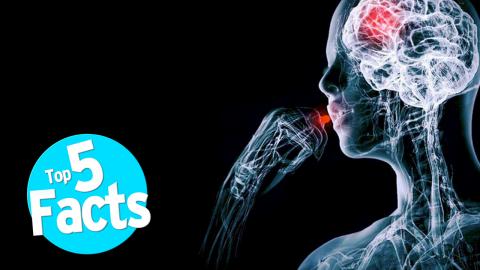Top 5 Unbelievable Placebo Facts

If medicine works, who cares if it has any actual medicine in it, right? The science behind the placebo effect is not very well understood, but some of its implications are incredible!
Special thanks to our users MikeyP and MikeMJPMUNCH for submitting the idea on our Interactive Suggestion Tool at http://www.WatchMojo.comsuggest
Top 5 Placebo Effect Facts
Medicine is like anything else– for the average person, the results are all that really matter. So if the treatment works, who cares if there’s anything real about it? Welcome to WatchMojo’s Top 5 Facts. In today’s instalment we’re counting down the five most fascinating facts about the placebo effect– in which an individual feels the experiences benefits or effects of a specific treatment or drug, which, in reality, has no active ingredients or medical effectiveness.
#5: You Can Get Placebo Crunk
It’s a popular convention in film and television– what happens when you give a bunch of people fake drugs or alcohol? They get messed up... or at least, they think they do. A team of psychologists from Victoria University in New Zealand put the “fake buzz” trope to the test. And not only did participants really believe they were feeling the effects of inebriation, but their brains went along for the ride, showing signs of legitimately impaired memory. Some 148 students were told that half of them were getting vodka tonics, the other half just tonic water, and were then shown scenes from a crime. Those who thought they’d been drinking proved to be significantly less reliable witnesses. Now that’s a cheap drunk.
#4: Placebo’s Got An Evil Twin: The Nocebo Effect
A faux-drunken experience might seem like affordable fun, but is it worth a fake hangover? The placebo effect is undeniably powerful, but as comic books have taught us, with great power... usually comes an evil twin or dark doppelganger. Introducing the Nocebo effect, otherwise known as ‘the negative side effects’. Faith in a treatment can yield positive results on patient’s health, but it’s equally possible for them to manifest the negative side effects they’d expect from a treatment. For example, placebo drugs are particularly effective against depression. But when one comparative study participant attempted to overdose on his placebo antidepressants, his body responded accordingly showing signs of a real overdose, including critically low blood pressure. The mind is a powerful thing.
#3: Animals Experience It Too
If the placebo effect is a manifestation of patient expectation, how can it work for animals? It’s not like Rufus understands that treatment “X” is intended to relieve his arthritis. But a 2010 study published in the Journal of Veterinary Internal Medicine found that a placebo treatment for canine seizures resulted in anywhere between 26% and 46% reduction in the occurrence of seizures. We’ve only scratched the surface of this topic, but one theory posits that the placebo effect in animals directly relates to the expectations of pet owners. Dogs are keenly attuned to human emotion and body language, so if an owner appears genuinely hopeful and positive around the pet, that expectation and elevated mood can promote a sense of wellbeing in the animal.
#2: Placebo Packaging Matters, Especially the Color
Tricking the body into healing itself is all about salesmanship. And when it comes to health, the human brain is rife with subconscious associations to which a placebo drug can appeal, such as color psychology. A doctor telling a patient that the drug in question will work is all well and good, but packaging is crucial to a placebo drug’s effectiveness. Studies have revealed that people find blue pills to be the most effective sedatives, whereas yellow placebos work best against depression. Name brand placebo pills yield better results than generic alternatives. But different regions of the world have unique cultural associations that can trump these general rules. For whatever reason, instead of calming them down, blue pills really get the blood flowing for Italian men. Can’t imagine why.
#1: The Placebo Effect Has Become More Effective over the Years
Maybe pharmaceutical companies have perfected their marketing, or humanity’s faith in medicine has simply grown stronger with the many recent advancements. Whatever the reason, the effectiveness of placebo drugs is stronger now than ever. In fact, American pharmaceutical companies have recently encountered issues– new drugs are failing their double-blind placebo trials, meaning that the placebo drug is yielding the same or better results as the actual drug. It’s frustrating for “Big Pharma”, but undeniably intriguing for progressive health care professionals. Research doctors have even begun to experiment with placebo surgeries, to address issues like chronic pain. As far-fetched as it may sound, placebo surgeries have yielded real results. Don’t worry though, unless you are consenting to be part of a trial, prescribing placebo treatments is still considered far too unethical to be an accepted medical practice.
So is the key to health a question of mind over matter, or marketing over mind? Have you ever seen the placebo or nocebo effect in action firsthand? For more highly persuasive top 10s and epileptic dog Top 5s, be sure to subscribe to WatchMojo.com.
